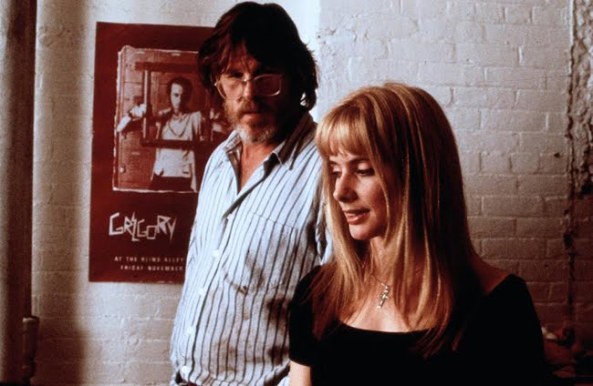How come filmmakers don’t make love letters to Chicago? That’s the movie I want to see. There are already enough odes to New York, and even in 1989 when Martin Scorsese, Francis Ford Coppola and Woody Allen together made “New York Stories,” a collection of three short films taking place in the city, the three of them had already made movies in which the Big Apple was a vital player. None of these are as good as “Taxi Driver,” “Mean Streets” or “Manhattan,” and yet all three are at least interesting, if flawed vanity projects for some of the greatest directors living today.
“Life Lessons”
“Life Lessons” is so clearly a Scorsese film before the title credits even roll because of the stylization that dominates the film. Procol Harum’s “Whiter Shade of Pale” is blared at us as the camera lunges away from an abstract painting and swivels and edits with alacrity. It strongly asserts the magnetic, but strange relationship between the artist Lionel Dobie (Nick Nolte) and his young assistant Paulette (Rosanne Arquette). She’s returned to New York from a vacation in Florida even though she’s assured Lionel she is leaving and never coming back to him, a sure sign of how people may be reluctant to return to New York, but it always seems to call them back.
“Life Lessons” is a film that embodies the intellectual and animal struggle of the New York artist. You go to New York to find yourself and realize you’re stuck. Paulette is living in a hole of a room above Lionel’s decrepit, but vast studio, her feet are ogled by Lionel as he sports a ratty button up smock filthy even for an artist, and she realizes she probably isn’t any good to cut it in New York. This feeling of being stuck, talentless, pretentious and lost is very familiar, and Scorsese captures it in his dynamic storytelling. But he also spots the moments of musical and artistic clarity and brilliance when he blares a cover of Dylan’s “Like a Rolling Stone” and shows why both Lionel and he are masters at work.
The problem however is that Scorsese has never been one to wallow in the extremely intellectual and philosophical waters of this sort of character drama. Even Travis Bickle is more everyman than Lionel Dobie, and “Life Lessons” becomes a film that is at once full of technical flourishes and dense monologues. The two don’t always fit, and it would be a real struggle were this not such a performance piece. Nolte and Arquette are wonderful, and Steve Buscemi has a great, memorable sequence for being so brief.
“Life Without Zoe”
In Coppola’s New York, the haute bourgeois that control the upper crust of society are little more than spoiled preteen girls. That they too can display some genuine pathos and sincerity while also being a bit of a joke is the point of “Life Without Zoe,” but it’s a hugely ambitious and goofy short story that feels strange for something insincere and doesn’t work on a literal level either.
The film centers around the 12-year-old Zoe (Heather McComb), a New Yorker with a deep pocket book and equally deep set of friends and contacts. She enlists the help of an even wealthier new friend at school to help her repair her family’s damaged marriage and return a priceless diamond earring to its rightful owner. The whole film has a slight caper element to it, but the docile narration by Zoe, the dopey Italian butler (Don Novello) and the garish set dressing in a costume party scene muddle the whole tone. In fact, “Life Without Zoe” seems to keep getting stranger as the film gets more and more vanilla.
I had to wonder why Coppola would make a film so strange and silly. His daughter Sofia helped write the screenplay and was only 18 at the time. She’s well beyond Zoe’s age, but just ending the period of teenage decadence Zoe represents and is about to enter into.
“Oedipus Wrecks”
The beauty of Woody Allen is that he can find the collective identity of a city by delving into his own problems and neuroses. In “Oedipus Wrecks,” Allen very simply shows that just about everyone knows and deals with someone like Woody Allen’s mother.
Allen’s own persona this time around is Sheldon Mills, who has reached the end of his rope with his mother, Mrs. Millstein. After all these years, she’s still quick to remind everyone that Sheldon felt it necessary to change his name. She also points out that he shouldn’t marry his fiancee (Mia Farrow) and proceeds to bother him at work. Sheldon wonders if things were better if she just disappeared, and at a magic show, he gets the chance to witness a little fantasy of his as his mother is used in a trick and does disappear. The problem starts however when Mrs. Millstein does turn up missing due to the trick.
Without spoiling the movie’s cute fun, Allen plays on a very silly, occult plot device to create the movie’s comedy and thesis statement. It’s too unreal, even for farce, or at least doesn’t fit in this instance. I will say however that I had a “mini-stroke” when Julie Kavner says that in her three past lives she “was a pianist, a ballerina and did all the laundry for Genghis Khan.”


